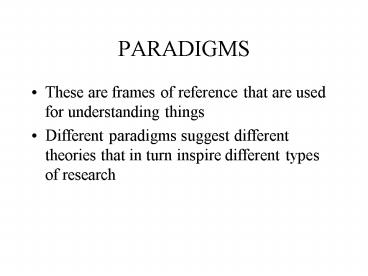PARADIGMS - PowerPoint PPT Presentation
Title:
PARADIGMS
Description:
Social science research takes the model that human behavior is determined by ... Social science operates on the basis of causal model that is probabilistic in nature. ... – PowerPoint PPT presentation
Number of Views:47
Avg rating:3.0/5.0
Title: PARADIGMS
1
PARADIGMS
- These are frames of reference that are used for
understanding things - Different paradigms suggest different theories
that in turn inspire different types of research
2
- Different Paradigms
- Interactionist--- holds that social life consists
of interactions through which individuals create
meanings - Structural Functionalism- treats society and
social groups as integrated whole composed of
parts, with each performing functions within the
whole - Conflict social life is a struggle for
domination
3
Write the answers to the following questions in
your notebooks.
- How would a fundamentalist Christian interpret
the world? How would they view sex education in
schools? - How do Marxists view the world? How would they
explain the fact that your pencil broke while
writing?
4
- Remember that no paradigm is better or truer than
the other. They are different ways of seeing
reality.
5
Theory --- Who Cares?
- Theories are general explanations that help us
make sense of many interrelated things
(description and explanation). They also help
develop expectations about the social world
(prediction).
6
Elements of Social Theory
- Axioms fundamental assertions taken to be true
on which theory is grounded. E.g. most economics
is based on the axiom that people are rational. - Proposition conclusions drawn about the
relationship among concepts derived from axioms - Hypotheses specific expectations about
empirical reality derived from propositions.
These are testable through empirical observation.
7
Why have Theories?
- Help guide action Theories help us decide what
to do when we are uncertain about a situation. - Help guide research Theories help us comprehend
reality.
8
What makes a theory good?
- Parsimony a theory that explains phenomena with
the fewest variables possible. - Generality we seek to establish general laws
which hold for all people. - Utility seek theories that are testable and
useful.
9
Deductive vs. Inductive theory
- Inductive implies starting with general question,
gathering large amounts of data and moving
towards more specific general conclusion - Deductive implies starting with specific question
that is based.
10
Inductive research
- Often call their theory Grounded Theory. why?
- Involves
- Asking general questions
- Recognize conventional wisdom
- Eliminate conventional wisdom
- Start over by observing data objectively
- General findings emerge
- Explain patterns and build theory
11
Deductive Research
- Data serves to test theories
- Involves
- Picking topic and reading everything on topic
- Specify range of phenomena theory applies to
- Find propositions that are known about how
concepts relate to one another - Deduce testable hypothesis that identify
specifically with proposition of general theory - Observe data and reject or accept hypothesis
12
Group Exercise
- Constitute into groups of fives and address the
following question - Construct a theory to explain why there is high
likelihood of stepchildren being battered by
their step parents. - Construct a theory to explain why obesity is so
prevalent nowadays.
13
The Seven Main Goals of Social Research
- 1. Identifying general patterns and
relationships - 2. Testing and refining theories
- 3. Making predictions
- 4. Interpreting culturally or historically
significant phenomena - 5. Exploring diversity
- 6. Giving voice
- 7. Advancing new theories
14
CAUSATION
- Determinism
- Is your behavior the product of free will?
- Social science research takes the model that
human behavior is determined by forces beyond the
individuals control. - Social science operates on the basis of causal
model that is probabilistic in nature.
15
- What is not part of the deterministic model
- Social scientists do not have to believe that all
human actions, thoughts, and feelings are
pre-determined. But when we seek to explain
things that lend themselves to social science
research, then we have to use the ideas of cause
and effect.
16
- Derterministic model does not assume that causal
patterns are simple. Nor are we all controlled by
the same factors and forces. - Derterministic model does not suggest we have
answers to all questions about what causes what.
17
Types of Causality
- Idiographic Singularizing approach
- Explanations are like stories apply to single
cases or individuals in specific time periods. - Nomothetic A very broad or generalizing
approach to causality. - Designed to discover those considerations that
are most important in explaining general classes
of events.
18
Establishing Causality
- Association An empirical association between the
dependent and independent variable must exist - Time order the independent variable must come
before the dependent variable. - Non-Spuriousness if two variables (X and Y)
happen to be related to a common extraneous
variable Z, then there can be a statistical
relationship between X and Y even though there is
no causal link between the two variables. In this
case the relationship between X and Y is spurious.
19
- Defining intervening mechanism if you can
explain the process by which X causes Y, it
increases the confidence we have in our
conclusions.































